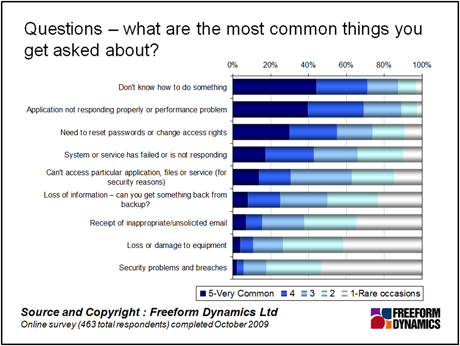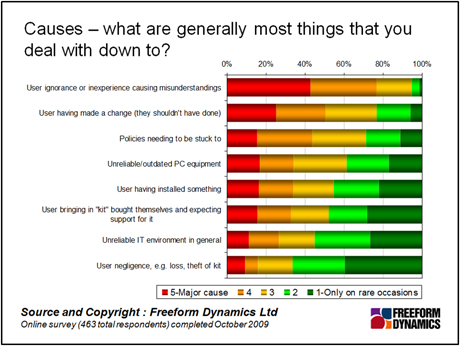The results are in from our latest mini-poll, and they are pretty conclusive – even if we take into account that removing users altogether is not an option. The top two types of call may be quite easily balanced – as you can see from the chart, between ‘don’t know how to do something’ and ‘application not responding’.

When we drill into the causes of calls – a clear ‘winner’ (if we can afford that dubious title) concerns user ignorance or inexperience. We’ve included the whole list here, just so you can see exactly how far ahead this was in terms of responses – over three quarters of respondents saw this as the issue.

It could be argued that (particularly given the self selecting nature of these polls) there might be a bit of an anti-user riff going on? After all, it is good to have an opportunity to rant. But there are plenty of other options which involve user foolishness, and which don’t merit as much of a response – use of own kit for example, or more general negligence issues. Nope, the number one challenge is, in a word, ‘ignorance’.
We could also see ignorance as the root cause of problem number two – that is, users making changes they shouldn’t. In previous workshops we have discussed the challenges in locking down IT environments in general, and desktops in particular – something that virtualisation can help with. But given the complexity of modern kit, this can be very difficult to do.
And we are all susceptible. I remember day two of a new job, when I arrived with a kit-bag of UNIX skills into a largely PC-oriented environment. Something wasn’t working quite right, so I tried to run a script I found on the desktop I’d been given. Suffice to say the script totally trashed the machine – how would I to know ‘access rights’ hadn’t yet been invented in Windows 3.1? Trouble was, neither had remote support and configuration, so some poor Charlie had to come all the way to Bristol to sort things out.
So, nobody has a monopoly on being dumb. And as you so clearly point out, user training and awareness has to be the answer – again, it’s the runaway option when we asked what would lighten your load. The second most important (achievable) option was enforcement of policy – which concurs with what we have seen from other studies, for example around security, where we have also learned the importance of setting workable policies in the first place
The point this illustrates (once again) is that IT is not just about technology – I know we bang on about this on occasion, but (as one kindly reader once said), if it was obvious, why does it remain untreated? The strange twist is, that it is most certainly about money – every support call has a cost in terms of both productivity and operational effort, and yet funding for user training can be very hard to come by.
But it’s not just about training either. If we order things according to unfunded and funded need (as in the figure below), we can see what respondents see as a priority to treat. Alongside awareness and policy we also see the importance of having a reliable, stable, modern desktop estate, and appropriate management tools in the mix as well.

Even taking such a shopping list into account, training and awareness stands out like a beacon. Looking at the figures, most other areas are at least given some kind of respect but it would take a minor miracle to change that one.
Through our research and insights, we help bridge the gap between technology buyers and sellers.



Have You Read This?
Generative AI Checkpoint
From Barcode Scanning to Smart Data Capture
Beyond the Barcode: Smart Data Capture
The Evolving Role of Converged Infrastructure in Modern IT
Evaluating the Potential of Hyper-Converged Storage
Kubernetes as an enterprise multi-cloud enabler
A CX perspective on the Contact Centre
Automation of SAP Master Data Management